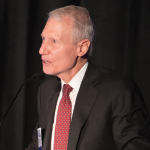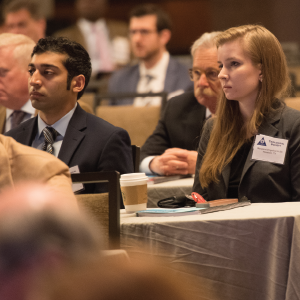
Trio President Mark Persky, MD
SCOTTSDALE—Otolaryngologists and head and neck surgeons from around the country and the world ventured to a resort in the Arizona desert to attend the Triological Society Combined Sections Meeting, held January 18–20 in Scottsdale. Meeting attendees listened to and traded thoughts on surgical techniques, ways to overcome burnout, and many other topics. Triological Society officials said that 520 physicians attended this year’s meeting.
Explore This Issue
March 2018Vivek Pandrangi, BA, a third-year medical student at Virginia Commonwealth University in Richmond, who presented a poster on sinusitis among hematologic transplant patients, said it was his first year attending the conference. “For me, it’s just been an exciting opportunity to present research and also get the time to network, from students to different faculty,” he said. “That sort of communication you don’t really get elsewhere. That’s why I’m pretty excited to be here. The talks are just very informative.”
Presidential Address Focuses on Leadership
In his Triological Society Presidential Address, Mark Persky, MD, discussed the importance of mentoring. “Is mentoring our obligation? The answer is a definite ‘yes’—not only for the members of the Triological, but also for our entire profession, both academics and non-academics,” he said. “What better legacy is possible than having the next generation of physicians become better than we are, by learning from our mistakes, observing our guiding activities, and heeding our advice?”

More than 500 physicians attended this year’s Combined Sections Meeting.
© america365 / shutterstock.com
Mentoring, he added, often comes in brief interactions, such as giving a few words of support during a stressful time; though they might seem insignificant to senior faculty members, these moments often have a lasting effect on the people they’re mentoring. “Such a brief experience may represent a lifetime memory for someone looking for support and guidance,” he said. “Don’t underestimate these brief moments of contact.”
He also stressed the importance of having a sense of humor as a mentor, and acknowledging when you may have made a mistake. “We should realize when we cross the line of being reasonable, and not only apologize but also be self critical and smile about [the fact that] we just may have done a dumb thing. You will gain respect and feel better about yourself.”
Dr. Persky also offered several words of wisdom, the first few of which are directed to residents:
- “Always focus on patients’ care and needs,” he said. “You can never be criticized for that.”
- Be prepared for the unexpected. He suggested always extracting as much information as possible from pre-operative imaging, formulating the 3-D anatomy, with all the landmarks and vital structures, and told residents to “always, always operate using both hands. They are your best instruments.”
- When operating, he stressed the importance of exposure. “If you know where a structure is, you know where it is not, including the carotid artery, the facial nerve, and other vital structures. Identify those important structures first, and then you can go about mobilizing and resecting the tumor.”
- Learn to be a good first assistant before trying to be a surgeon. “It’ll improve your operative skills.”
- Learn from each mistake. “We learn more from our mistakes than from our successes.”
- Try to make an active attempt to learn at least one new thing from each case that you perform, no matter how experienced you are.
- Don’t focus on speed. “It’s not the fastest surgeon who is the most effective during an emergency; it’s the one who keeps his cool and does what is necessary.”
- Build confidence; don’t tear it down. “Don’t be the professor who asks junior colleagues the questions to find out what they don’t know. Ask the questions to find out what they do know.”
- There’s no substitute for spending time with patients. “Listen to them, talk to them, examine them, answer their questions, and be there for them and their families in times of need.”
- Take time to smell the roses. “We all have different personal goals, some of them focusing on work and career and some on family and lifestyle. … If you do not enjoy what you are doing, you will not succeed.”